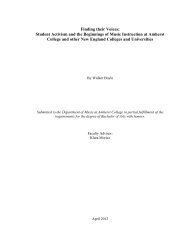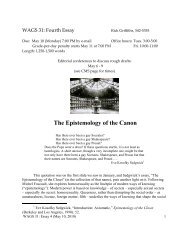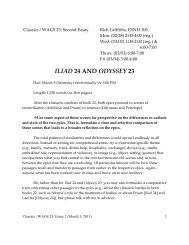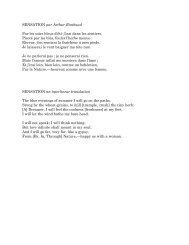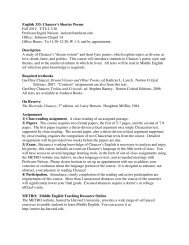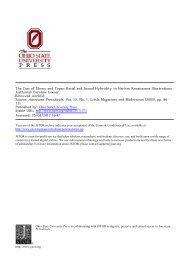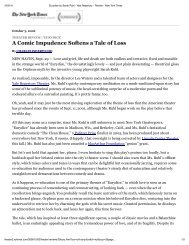Manet's Olympia: The Figuration of Scandal
Manet's Olympia: The Figuration of Scandal
Manet's Olympia: The Figuration of Scandal
Create successful ePaper yourself
Turn your PDF publications into a flip-book with our unique Google optimized e-Paper software.
Bernheimer * <strong>The</strong> <strong>Figuration</strong> <strong>of</strong> <strong>Scandal</strong> 265<br />
formed by Georges Bataille (1983 [1955]). Bataille quotes Paul Valery's<br />
eloquent description <strong>of</strong> <strong>Olympia</strong> only to contest its accuracy. "<strong>The</strong><br />
naked and cold <strong>Olympia</strong>, monster <strong>of</strong> banal love," writes Valery (1960<br />
[1932]: 1329), in terms reminiscent <strong>of</strong> Zola's description <strong>of</strong> the bourgeoisie's<br />
scandalized reaction to the artistic calling, "inspires a sacred<br />
horror.... [She is] the Impure par excellence, whose function requires<br />
the untroubled and candid ignorance <strong>of</strong> all modesty. Bestial vestal devoted<br />
to absolute nudity, she makes one dream <strong>of</strong> all that hides itself<br />
and is preserved <strong>of</strong> primitive barbarism and ritual animality in the<br />
ways and workings <strong>of</strong> big-city prostitution." Bataille (1983 [1955]: 62)<br />
admits that this conception may constitute what he calls the text <strong>of</strong><br />
the painting, but he insists that "the text is effaced by the painting. And<br />
what the painting signifies is not the text but the effacement. It is to the extent<br />
that Manet did not want to say what Valery says-to the extent, on the<br />
contrary, that he suppressed (pulverized) meaning-that this woman<br />
is there. In her provocative exactitude, she is nothing; her nudity (corresponding,<br />
it is true, to that <strong>of</strong> the body) is the silence that emerges<br />
from her as from a stranded ship, a vacant ship. What she is, is the<br />
'sacred horror' <strong>of</strong> her presence-a presence whose simplicity is that<br />
<strong>of</strong> absence" (Bataille's emphasis).<br />
One recognizes in this passage a strategy and vocabulary that has<br />
had widespread critical success in recent years: the text as effacement,<br />
the suppression <strong>of</strong> meaning, the articulation <strong>of</strong> silence and absence.<br />
<strong>The</strong> present context, linking Zola to Bataille, allows us to suggest<br />
one possible motive behind this strategy. Bataille uses it quite specifically<br />
against "all that hides itself and is preserved" in what Valery<br />
perceives as a primitive, animalistic, degraded, yet imposing female<br />
sexuality. That shockingly impure sexuality is reduced by Bataille to<br />
nothing; <strong>Olympia</strong> as subject is pulverized, the power <strong>of</strong> her nudity is<br />
emptied <strong>of</strong> physical reference, her body is incongruously compared<br />
to a stranded boat, and her disturbing erotic presence is considered<br />
significant only ins<strong>of</strong>ar as it is effaced. Bataille himself acknowledges<br />
the violence involved in these operations. However, he attributes them<br />
not to the murderous desire at work in his own fascinated gaze but<br />
to the reductive operation performed by the painting itself. "<strong>Olympia</strong><br />
as a whole cannot easily be distinguished from a crime or from the<br />
spectacle <strong>of</strong> death," writes Bataille (ibid.: 69), after having evoked, as<br />
Zola did, the picture's admirable still-life qualities.<br />
<strong>Olympia</strong> is once again laid out at the morgue, this time, however, by<br />
a thinker willing to recognize his erotic attraction to this morbid spectacle.<br />
Bataille clearly enjoys his participation in the crime <strong>of</strong> <strong>Olympia</strong>'s<br />
death, for, as he maintains later, the final sense <strong>of</strong> eroticism for him<br />
is death, silence, the violent transgression <strong>of</strong> the Other's individuality.<br />
That Other is quintessentially woman, woman as object <strong>of</strong> aggressive



